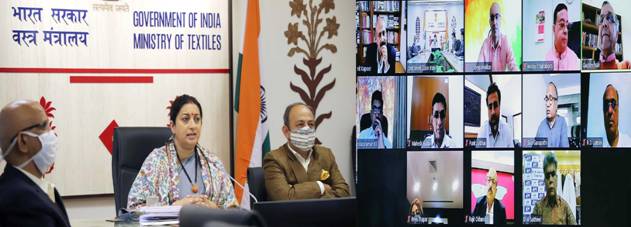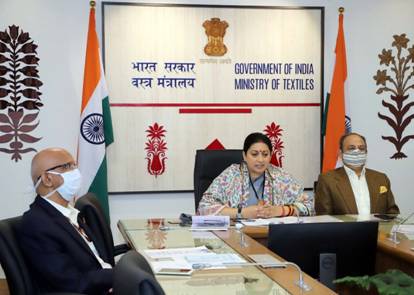365telugu.com online news,Delhi,december11th,2020: Union Textile Minister, Smt. Smriti Zubin Irani has stated that the concerted efforts of the government, industry and multiple stakeholders turned the PPE crisis into an opportunity for India. Delivering the Keynote address at a Webinar “A Movement Towards AtmaNirbhar Bharat,” here today, the minister said that this successful journey has become an inspiration for other indigenous manufacturers, and the way forward is for other sectors to replicate this success story. “Even though the thrust on PPE manufacturing was necessitated by the health crisis, the success of PPE has opened new doors for indigenous manufacturers in other industries as well,”she added.The Minister mentioned that there was a modicum of trust between government and industry, which made it a success. Crediting the industry for entrusting the government and rising to the challenge in a limited time, she added, “No one in the industry asked for a subsidy, nor the govt. offered it. Another thing I’m proud of is that in a lockdown state, we have ensured 5 lakh sustainable direct jobs. That is the part of the PPE and testing swab revolution that has not been highlighted”.

Smt. Irani informed that the scale of manufacturing PPE suits and masks has increased at such an exponential rate that by October, over 60 million PPEs were produced domestically, of which over 20 million PPE suits were exported. Over 150 million N-95 masks were produced, of which over 40 million masks were exported. She said that starting from zero, today we have over 1100 companies for PPE suits and over200 domestic manufacturers for N-95 masks. The minister said “We did not dilute the international standards. We are the only industry that came up in a lock down in the entire world economy and we did it either at a comparative cost or at 10% of import cost. Not only we expanded in size but we are also comparative with the best in the world in terms of cost. I can rejoice in the fact that industry and Government came together.” Complementing the Industry leaders for their whole-hearted support and trust, the minister said that government will act as a facilitator and continue to provide supportive environment and ecosystem to the industry for their growth.
In his address, Secretary, Ministry of Textiles, Ravi Capoorcomplimented the efforts of Institute for Competitiveness (IFC) for documenting the successful story of Ministry of Textiles in PPE manufacturing. He said what is remarkable about this journey is that India created an industry when none existed in just 60 days. He also explained how the government is aiding the industry in their efforts. He said, “We are deliberately pushing the industry out of its comfort zone, and pushing them into man-made fibre and technical textile. We are creating an entire ecosystem through different schemes and removal of barriers in the supply of raw material, through a very facilitative textile policy, through setting up of a world-class lab in technical textile, and so on. So, a whole new textile ecosystem is starting to get implemented. If all goes well, India’s textile industry will hugely be kicking in a new direction in one to two years’ time”.

The webinar was organised by Institute for Competitiveness (IFC) and attended by stakeholders from the industry and institutions involved in this initiative. The session also discussed a study done by the Institute for Competitiveness.The study by IFC states that the Ministry of Textiles turned the crisis into an opportunity to transform India into a global export hub of high-quality PPE kits. On January 30, 2020, when the first coronavirus case was reported in India, PPE kits including full body coveralls suitable for COVID-19 (classified as class-3 protection level under ISO 16603 Standard) were not manufactured in India. Realising the implications of India’s high import dependency for India’s healthcare sector, the governmenthad launched the “Go Local” initiative to turn this crisis into an opportunity to develop an indigenous supply chain for manufacturing class-3 PPEs and testing swabs. Accordingly, MoT was given the task in February, 2020 to lead this initiative and set up the end to end value chain. As part of the planning process, the MoT and MoHFW undertook a joint study, which also involved textile and healthcare industry experts, industry associations and major manufacturing companies in India.The Ministry of Textiles launched the Indigenous End to End Capacity Building Initiative for Manufacturing PPE Kits in March 2020.
While countries began to limit their export of PPE kits, India was estimated to require more than 20 Million PPE Kits and 40 Million N-95 class masks by July 2020. Beating all odds, India developed an indigenous network of PPE fabric and garment manufacturers in just 60 days. By mid-May, India had the capacity to manufacture 4.5 lakhs pieces of body coveralls and 2.5 lakhs N-95 masks per day. India also began exporting PPE’s to the US, the UK, Senegal, Slovenia, and UAE. Today the N-95 manufacturing capacity has reached 32 lakh per day with 200 manufacturers.

The South India Textile Research Association (SITRA) led the testing programme for domestically manufactured PPE kits during the pilot run in Mar-Apr 2020. Later, seven more government entities were approved as testing and certification labs for PPE Body Coveralls. These labs were strategically selected across different parts of India to ensure efficient testing of PPE kits across the country and to reduce the post-production timeframe involved in testing, clearance, and dispatch of the PPE kits.Institute for Competitiveness, India is the Indian knot in the global network of the Institute for Strategy and Competitiveness at Harvard Business School. The institute studies competition and its implications for company strategy; the competitiveness of nations, regions & cities and thus generate guidelines for businesses and those in governance; and suggests & provides solutions for socio-economic problems.

